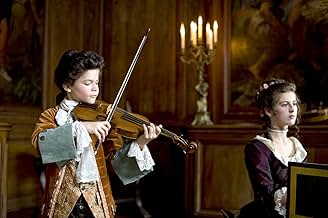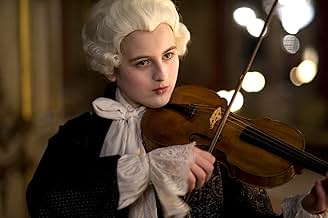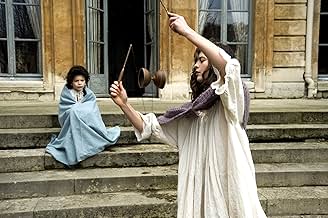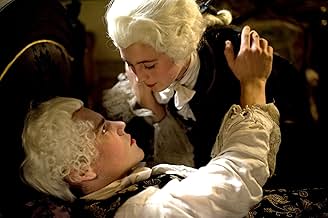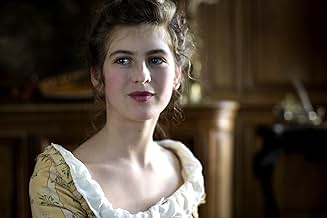VALUTAZIONE IMDb
6,4/10
1646
LA TUA VALUTAZIONE
Aggiungi una trama nella tua linguaA reimagined account of the early life of Maria Anna 'Nannerl' Mozart, five years older than Wolfgang, and a musical prodigy in her own right.A reimagined account of the early life of Maria Anna 'Nannerl' Mozart, five years older than Wolfgang, and a musical prodigy in her own right.A reimagined account of the early life of Maria Anna 'Nannerl' Mozart, five years older than Wolfgang, and a musical prodigy in her own right.
- Regia
- Sceneggiatura
- Star
- Premi
- 2 vittorie e 8 candidature totali
Recensioni in evidenza
Léopold Mozart promotes his musical children; Wolfgang and his elder 14 year old daughter Maria Anna 'Nannerl' Mozart (Marie Féret) to the royalties throughout Europe. He tries to restrict Nannerl's musical ambitions in the patriarchal society. She believes she may have contributed to Wolfgang's writing but Léopold dismisses her and forbids her from continuing to write. She befriends the daughters of the King especially Louise. She delivers a letter to Louise's brother Le Dauphin in mourning but she has to be disguised as a man to avoid a scandal. He encourages her to write. She meets him several times but only in disguised. He is conflicted about making her his mistress unwilling to repeat his father's debauchery.
This is an intriguing fictional biography. Marie Féret is the director's daughter and mostly fails to energize this costume period piece. The movie is two hours long and requires her to carry it on her shoulders. This has loads of potential for scandal and passion but none of it comes to pass. This does have a quiet beauty but is mostly a squandered opportunity.
This is an intriguing fictional biography. Marie Féret is the director's daughter and mostly fails to energize this costume period piece. The movie is two hours long and requires her to carry it on her shoulders. This has loads of potential for scandal and passion but none of it comes to pass. This does have a quiet beauty but is mostly a squandered opportunity.
It seems very tempting, Mozart's Sister – the opportunity of another 18th century costume picture, this one from France – produced, written and directed by René Féret. For those who enjoy historical fiction, the film poses as yet one more chance to unlock the doors and peer into the family closets of composer Wolfgang Amadeus Mozart. After all, it's been twenty-seven years since the spectacular emergence of director Milos Forman's Amadeus, which gathered eight Oscars, including Best Picture – as well as for the author of its screenplay, Peter Shaffer, adapting and shaping his multi-Tony Award-winning theatrical masterpiece into iconic cinematic genius. Since the 1984 premiere of Amadeus, business continues to boom in the Mozart industry; a chance at playing either of the Leading Roles of the so-called "rivals" – Mozart and (the nearly forgotten and second-rate) composer Antonio Salieri – continue to inflame the ambitions of many a stage actor; and a recent release of the film into Blu-Ray format proves that Amadeus is here to stay and guaranteed a re-incarnation into whatever format is on the horizon. Mozart's Sister is destined for landfill.
Amadeus and Mozart's Sister are both of the "re-imagined" variety. In other words, for its authors, Truth is but an adjunct to Creative License. Re-imagining the adventures of the Mozart family begins somewhere in a flurry of sheet music, ribbon-bound letters, yellowing diaries, and stories heard around any Music Conservatory. Somewhere in this reverie, René Féret and Peter Shaffer both employ the same controlling gimmick — "I coulda been somebody!" For Shaffer, Salieri knows his musical gifts are lacking, but the Viennese Court doesn't know it until Mozart suddenly shows up. According to Féret, Mozart's sister Nannerl believes that – had she been born as Wolfgang's brother – they might have become the first European Dynamic Duo. No need for Certitude here. "Re-imagined" needs just a few facts and figures, but the finished product requires the entertainment value of Barnum & Bailey. Mozart's Sister wouldn't qualify for a side show.
René Féret's shooting script of Mozart's Sister cannot avoid comparison to Amadeus. Peter Shaffer nurtured his idea through the disciplines of live Theatre. The structure and rhythm of his re-imagined Amadeus is developed through much rehearsal and three continuous years on Broadway before he re-vamps the script for Hollywood. By contrast, Féret's end product is a plodding, witless and gloomy bore. His treatment of the premise that Nannerl Mozart is a suppressed and thwarted genius composer with Box Office appeal similar to that of her brother's – is limp and void of artistic climax. Likewise, there's no satisfaction to be had in the tedious and anemic performances rendered by Féret's daughters – Marie as "Nannerl" and Lisa as "Louise of France".
Salieri, on the other hand, would applaud Mozart's Sister for its inherent mediocrity.
Amadeus and Mozart's Sister are both of the "re-imagined" variety. In other words, for its authors, Truth is but an adjunct to Creative License. Re-imagining the adventures of the Mozart family begins somewhere in a flurry of sheet music, ribbon-bound letters, yellowing diaries, and stories heard around any Music Conservatory. Somewhere in this reverie, René Féret and Peter Shaffer both employ the same controlling gimmick — "I coulda been somebody!" For Shaffer, Salieri knows his musical gifts are lacking, but the Viennese Court doesn't know it until Mozart suddenly shows up. According to Féret, Mozart's sister Nannerl believes that – had she been born as Wolfgang's brother – they might have become the first European Dynamic Duo. No need for Certitude here. "Re-imagined" needs just a few facts and figures, but the finished product requires the entertainment value of Barnum & Bailey. Mozart's Sister wouldn't qualify for a side show.
René Féret's shooting script of Mozart's Sister cannot avoid comparison to Amadeus. Peter Shaffer nurtured his idea through the disciplines of live Theatre. The structure and rhythm of his re-imagined Amadeus is developed through much rehearsal and three continuous years on Broadway before he re-vamps the script for Hollywood. By contrast, Féret's end product is a plodding, witless and gloomy bore. His treatment of the premise that Nannerl Mozart is a suppressed and thwarted genius composer with Box Office appeal similar to that of her brother's – is limp and void of artistic climax. Likewise, there's no satisfaction to be had in the tedious and anemic performances rendered by Féret's daughters – Marie as "Nannerl" and Lisa as "Louise of France".
Salieri, on the other hand, would applaud Mozart's Sister for its inherent mediocrity.
It's difficult for me to see a film like this as a professional musician without seeing red at the same time. No, I'm not expecting a slavish rehash of history - far from it -but it wandered so far from reality as to remind me of films such as "Song to Remember" with Cornel Wilde swinging through the grapevines and playing the frail, tubercular Chopin at the same time.
Leopold Mozart, despite the general feeling that he pushed his children unmercifully, was actually trying to help his children become established in the world and to prevent his son from squandering his money as he was always tempted to do. In fact poor Wolfgang was buried in a pauper's grave after his father died.
The music in the film is another bone of contention. Instead of using something from the immense amount of music Wolfgang composed as background, it substituted a fake Classical imitation with romantic harmonies and orchestration that really wasn't good to begin with.
As for the ultra-low lighting we associate with "le film noir' or crime shows currently on television, we had to depend too often on dialog alone to guide us through what was happening. I realize that filming interiors with candles was period but even people sitting next to them were mainly in the dark. I know this is handy for not having to provide full period sets in detail but still I felt cheated.
This is a French work, nonetheless, and as so many French films are prone to do, it talks itself to death.
Curtis Stotlar
Leopold Mozart, despite the general feeling that he pushed his children unmercifully, was actually trying to help his children become established in the world and to prevent his son from squandering his money as he was always tempted to do. In fact poor Wolfgang was buried in a pauper's grave after his father died.
The music in the film is another bone of contention. Instead of using something from the immense amount of music Wolfgang composed as background, it substituted a fake Classical imitation with romantic harmonies and orchestration that really wasn't good to begin with.
As for the ultra-low lighting we associate with "le film noir' or crime shows currently on television, we had to depend too often on dialog alone to guide us through what was happening. I realize that filming interiors with candles was period but even people sitting next to them were mainly in the dark. I know this is handy for not having to provide full period sets in detail but still I felt cheated.
This is a French work, nonetheless, and as so many French films are prone to do, it talks itself to death.
Curtis Stotlar
I found "Mozart's Sister" on Amazon Prime Video to stream for free. I'm a musician myself of almost a decade playing guitar, bass, and drums. Several years ago in high school I was in an advanced choir that covered some of Mozart's work. Since then I was always fascinated with Mozart. Who was he, why was he such a musical genius? Why did he die so young? The history and sound of Mozart continues to fascinate me and when I seen this film on Amazon Prime, I had to check it out.
Mozart's Sister revolves around the story of Nannerl Mozart (Maria Anna Mozart), the older sister of the musical genius that is Wolfgang Amadeus Mozart. Despite my fascination and reading into Mozart, I knew nothing of him having a sister. I watched this film all in French with English subtitles, but that didn't hurt the quality of the film. Mozart's Sister is a great film. The camera work, costumes, music, and the works, all 110% authentic. There are no visible flaws of any kind in the film work.
The whole movie revolves around a teenage/young adult Maria Anna Mozart. We get to see how she herself was a magnificent instrumentalist and composer that nearly rivaled her brothers musical abilities. But because of sexism and social status in mid 1700's Europe, she was often pushed aside and disregarded in favor for her brother's work. We also get to see the rest of the Mozart family, Mozart's father who taught them music and his mother.
All and all I enjoyed this film. But I will say, it's not for everybody. If you're not into Mozart or his history, foreign films with subtitles, or movies about mid-1700 music, then maybe you should pass. This does feel like something you would watch in a schoolroom more than something you would watch on a Friday night. Also, "Mozart's Sister" has it's dull moments at times, and the movie never really evolves into anything more than Marianne's early years. We don't get to see her grow up, go through her brothers death later in life, or anything along those lines. I felt if we got to see more of her older life it would have been more grabbing. Still, good movie, average rating of 7/10, good movie with great cinematic/sound work, good acting, just had a few low points that stopped it from being a great movie.
Mozart's Sister revolves around the story of Nannerl Mozart (Maria Anna Mozart), the older sister of the musical genius that is Wolfgang Amadeus Mozart. Despite my fascination and reading into Mozart, I knew nothing of him having a sister. I watched this film all in French with English subtitles, but that didn't hurt the quality of the film. Mozart's Sister is a great film. The camera work, costumes, music, and the works, all 110% authentic. There are no visible flaws of any kind in the film work.
The whole movie revolves around a teenage/young adult Maria Anna Mozart. We get to see how she herself was a magnificent instrumentalist and composer that nearly rivaled her brothers musical abilities. But because of sexism and social status in mid 1700's Europe, she was often pushed aside and disregarded in favor for her brother's work. We also get to see the rest of the Mozart family, Mozart's father who taught them music and his mother.
All and all I enjoyed this film. But I will say, it's not for everybody. If you're not into Mozart or his history, foreign films with subtitles, or movies about mid-1700 music, then maybe you should pass. This does feel like something you would watch in a schoolroom more than something you would watch on a Friday night. Also, "Mozart's Sister" has it's dull moments at times, and the movie never really evolves into anything more than Marianne's early years. We don't get to see her grow up, go through her brothers death later in life, or anything along those lines. I felt if we got to see more of her older life it would have been more grabbing. Still, good movie, average rating of 7/10, good movie with great cinematic/sound work, good acting, just had a few low points that stopped it from being a great movie.
the beauty of costumes and music. the touching story of a great and obscure sacrifice. Marie Feret as lovely Nannerl. and Wolfgang as secondary character. important is not the historical accuracy or the legend's proportion. but the atmosphere. it is only a film about a little known biography , well made, nice to beautiful, recreation of a myth in new therms, seductive for the details and for the new perspective about a well known subject. a film about art and about a life in shadow. a film about success and about the truth. proposing a new hero. special for be not usual drawing portrait of an admirable woman. that could be all. or just the beginning for the viewer who rediscover the Mozart family in different light.
Lo sapevi?
- BlooperNear the opening of the film, Nannerl tells Louise that she is 14, almost fifteen. This place the action in the winter of 1765-66. While the character Louise says she is 13, the real Louise would have been 28 years old. In fact, the princess return to court from the Abbey of Fontevraud in 1750, the year before Nannerl's birth.
I più visti
Accedi per valutare e creare un elenco di titoli salvati per ottenere consigli personalizzati
- How long is Mozart's Sister?Powered by Alexa
Dettagli
- Data di uscita
- Paese di origine
- Siti ufficiali
- Lingua
- Celebre anche come
- Mozart's Sister
- Luoghi delle riprese
- Aziende produttrici
- Vedi altri crediti dell’azienda su IMDbPro
Botteghino
- Budget
- 4.500.000 USD (previsto)
- Lordo Stati Uniti e Canada
- 707.885 USD
- Fine settimana di apertura Stati Uniti e Canada
- 34.046 USD
- 21 ago 2011
- Lordo in tutto il mondo
- 1.380.379 USD
Contribuisci a questa pagina
Suggerisci una modifica o aggiungi i contenuti mancanti


